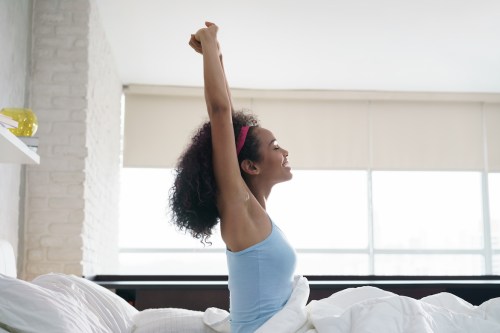Getting enough sleep is one key component to promoting mental health, but when, specifically, you clock those hours may have more influence on your psyche than what was previously known. A recently published study in JAMA Psychiatry found that shifting your sleep schedule back just one hour—that is, going to bed one hour earlier and then waking up one hour earlier—corresponded to a 23 percent lower risk of depression. This makes the possibility of improved mental health one potential scientific benefit of waking up early.
Experts in This Article
psychotherapist with Manhattan Wellness
A person’s sleep chronotype—which is basically a personality type-esque breakdown of when we tend to go to bed and wake up—can be explained up to 42 percent by genetics, according to the study researchers from the University of Colorado Boulder and the Broad Institute of MIT and Harvard. Some people’s sleep chronotypes predispose them to wake up earlier, and the study—which analyzed genetic data, prescription records, and medical surveys of 840,000 people—found that those with the “early bird” genetic variants were also less likely to experience symptoms of depression.
But it’s not all left up to genetics: Since more than half of what determines your sleep chronotype is learned or driven by lifestyle (i.e., not connected to a genetic predisposition), the study’s findings can serve as evidence for night owls to prioritize actively becoming morning people.
The study’s findings can serve as evidence for night owls to prioritize actively becoming morning people.
One caveat of the findings is that it’s unclear whether the conclusion applies to folks who are already morning people (and who go to sleep on the earlier side, too). Meaning, those who go to bed and wake up on the later side—for example going to sleep at 1 a.m. and waking up at 9 a.m.—could see improved mental health by shifting their full sleep timing earlier. But if you’re a 9 p.m.-to-5 a.m. kind of person, it may or may not benefit you to skew even earlier. In order to clarify whether you’re simply less at risk of experiencing depressive symptoms by already being an early riser, more research is needed.
According to lead author Iyas Daghlas, a large clinical trial would help determine whether going to sleep earlier has a definitive causal effect on depression, though he said in a press release that these findings shift the weight of the evidence in that direction. His assertion is supported by an observational study published in the Journal of Psychiatric Research in 2018 analyzing the sleep schedules and mental health of 32,000 women nurses, which found that early risers were up to 27 percent less likely to develop depression over the course of four years.
Potential reasons to support this scientific benefit of waking up early:
The connection between earlier sleep timing and lower risk of depression may have to do with circadian rhythm and early risers getting more light exposure throughout their awake hours. “We know that exposure to sunlight has an impact on our moods,” says psychotherapist Michele Miller, LCSW. “For example, looking at seasonal affective disorder, it’s the longer, darker days that lead people to feel depressed and less energized—so, getting up earlier allows you to experience more daylight, which could make you feel more energized.” And if you’re doing that on the regular, it could lead to the decreased depression risk identified above.
Another explanation: Our society is mostly optimized for early risers, with work and school schedules typically requiring most of us to rise not long after the sun. “Evening people often feel as if they are in a constant state of misalignment with that societal clock,” Daghlas said in the study press release. That feeling of being out of sync, in and of itself, could contribute to the greater prevalence of depressive symptoms identified in the study among the late sleepers.
Interestingly, even if the lack of a commute to either work or school during this virtual-everything era has given you more time to sleep, it may still be a boon to your mental health to wake up at what would’ve been your typical hour, and use the extra time before the start of the workday to prioritize self care.
“Allowing time for yourself in the morning, instead of rolling out of bed and flipping open your computer, can make a big difference in how you feel,” adds Miller. You’ll have more opportunities to enjoy the sunlight, workout, meditate, or practice any other form of self-care, all of which can contribute to your overall well-being.
All of this being true, if you are experiencing symptoms of depression, it’s important that you do more than shift your sleep schedule. Seek the guidance of a mental-health provider who can work with you to develop a personalized plan.
—reviewed by Angela Holliday-Bell, MD
Below, watch as beauty and fitness editor Zoë Weiner tries waking up earlier as part of a new sleep and morning routine:
Oh hi! You look like someone who loves free workouts, discounts for cult-fave wellness brands, and exclusive Well+Good content. Sign up for Well+, our online community of wellness insiders, and unlock your rewards instantly.
Sign Up for Our Daily Newsletter
Get all the latest in wellness, trends, food, fitness, beauty, and more delivered right to your inbox.
Got it, you've been added to our email list.











